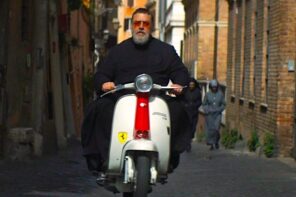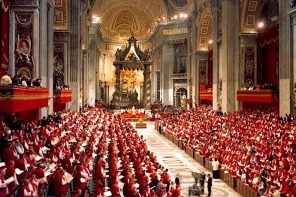The noted sociologist of religion, Max Weber (1864-1920), himself no stranger to the oddities of institutional behavior and the vagaries of institutional personality, was fascinated by the religious role of the prophet. In what is now a classic text in the field, he dedicated an entire chapter to the question of what “prophetic” figures, from a wide variety of different religious traditions, from all around the world, actually had in common. The two features most commonly imagined by his predominately western audiences were the prophet as critic of institutional misbehavior and the prophet as predictor of the future.
Weber was never particularly attracted by either idea. Instead, he offered an interpretation of the prophet that was notable for its elegant simplicity and broad comparative reach. The prophet, Weber suggested, is best defined as the unique bearer of charisma.
No sooner had Weber offered his “unified theory” of the prophet than he subdivided the essential concept again, noting that there were two very different kinds of charisma with which he had to deal. On the one hand, there is the charisma of personality; on the other, there is the charisma of office. The two forms rarely, if ever, overlap. Prophets, Weber noted with what I imagine were arched eyebrows and a knowing smile, never come out of the priestly class. To do their work well, they must not belong to the machine.
This distinction has great descriptive power. Roman Catholics may faint in the presence of the Pope; that is the charisma of the office. They are drawn to the charisma of the Supreme Pontiff, not to the particular quirky and uneasy personality of Benedict XVI, who is after all, simply one link in a charismatic chain.
By contrast, American teens fainted in the presence of the Beatles because they were…. well, because they were the Beatles. There was no office to hold, and they did not belong to the machine. Not yet. (John Lennon never did, and George Harrison never cared to try; Ringo signed on pretty early, and Paul, well, Paul is a figure about whom fans continue to disagree).
Weber had a distinctly tragic view of human and institutional life. He famously remarked that human beings are trapped in iron cages they have built themselves. Yet he saved his most tragic insights for the realm of the religious.
A prophet, no matter how charismatic, is mortal and departs the scene of prophetic success. If his or her followers wish to keep the movement alive in any significant way, they ironically must create a new machine, and a new office, to maintain that charismatic memory. Weber refers to this as the routinization of charisma. The charisma moves, from the person to the office. The prophet thus tragically gives birth to a new priesthood, requiring his or her followers to look elsewhere for the white-hot epiphany only the charisma of personhood can provide.
It seems to me that the confusion over how best to respond to the latest revelations of corporate greed—AIG executives awarded some of their own in excess of 160 million dollars in executive bonuses—might be analyzed most helpfully with Weber’s categories.
On the face of it, this looks for all the world like the violation of authentic prophecy. The people who are being rewarded are the same people who ran the company into the ground. These are not merit-based bonuses; they are bonuses of the office. They have nothing to do with the person involved nor their work record; they are bonuses that belong simply to the offices these people happened to hold last year, when the company ran aground on the shoals of its own recklessness.
It is interesting that AIG has actually offered a defense of these bonuses, however lackluster and aw-shucks the tone, by suggesting that they are not bonuses of office, but of personality. Such excessive bonuses for chief executives became standard practice in the 1990s, they suggest, when corporate America suffered its own version of sporting free agency. They were primarily “retention bonuses,” they argue, designed to keep top executives from leaving for the greener pastures of the competition. The reward is not so much to the office-holder, as it is to the person currently in the office, essentially a monetary incentive begging the current officeholder not to leave.
Enter President Barack Obama, a man who brilliantly, and perhaps tragically, embodies the conflict built into these two competing pictures of charisma. He ran, as well as any candidate in recent memory, on the power of his personal charisma. He has settled now, somewhat uneasily, into the charisma of presidential office, recognizing that—however committed he is to keeping his word from the campaign—he keeps his word now as a different man with a different charisma. He is no longer the new face of American politics, no longer the most important figure in African-American political life, and no longer the rhetorically gifted prophet who can recall us to the better angels of our nature. Now he is the President of the United States of America, the bearer of the charisma of an almost overwhelmingly powerful political office.
The President is now not only part of the machine; he runs the machine. And that, I would suggest, is one reason that his attempts to express the kind of moral outrage he justifiably feels on the taxpayers’ behalf fall a bit flat. He is trying to speak as a prophet who is still running for President, rather than as the President. He is trying to speak the moral outrage to which charismatic prophets often give voice. But corporate America is no longer quite so willing to put its tail between its legs and beg this prophet’s indulgence. Because he is no longer a prophet; he is a president.
It is a subtle difference, at times a maddening one, but I think it helps explain one of the many challenges the new President faces in this moment of spectacularly complex transitions.
He ran on change, prophetic change.
Then he was hit with “the worst economic crisis since the Great Depression.” And so he has assembled a team—in the economic and in the military arenas—that is utterly and exclusively a product of the machine. He does not dare roll the dice on the uncontrolled charisma of personality where the economy is concerned; so he ends up seeming to support the bearers of the offices, no matter how corrupt they become.
He may be right in this caution. He has ever been a cautious and reasoned and disciplined person. Yet unless he is very careful, and more mindful of the dramatic shift in roles that his very success has won him, he will find himself unable to speak against the very practices he ran against. His criticism of current corporate excess, given the team he has assembled to meet our current economic crises, cannot be the same as the one he would have surely offered in a speech, were it July 2008, and were the electoral outcome still in doubt.




